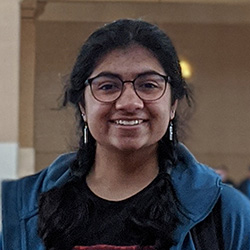Doctoral Student Vaidehi Srinivas Receives Presidential Fellowship
Northwestern Engineering computer science PhD student Vaidehi Srinivas has received a Presidential Fellowship, the most prestigious fellowship awarded to graduate students by Northwestern University.

“I'm honored to receive this fellowship, and I am excited to see where the next few years take me!” Srinivas said. “I'm also very grateful to the Northwestern CS community, who are incredibly supportive, both on the road to this fellowship, and in all other aspects of my academic journey.”
Funded by the President of the University and awarded by The Graduate School, Presidential Fellowships are bestowed annually to graduate students who are nominated by their academic programs. Less than 12 percent of nominated students are appointed to the Fellowship.
Fellows combine outstanding intellectual and creative talent with scholarly achievement and a demonstrated ability to communicate the significance and impact of their work to a broad academic audience. Leaders within their respective disciplines, Presidential Fellowship recipients join the Society of Fellows and participate in various gatherings and functions, including an annual retreat.
"I am thrilled that Vaidehi is receiving this prestigious fellowship. This fellowship will support her ambitious and exciting research agenda on the foundations of algorithms and machine learning," Vijayaraghavan said. "She is brilliant, independent, and passionate about both her research and in communicating science and engaging broadly with students of all ages."
Srinivas’s research focuses on designing and analyzing simple algorithms that are practical for real-world input. She is working on problems in theoretical machine learning related to minimizing an objective function using gradient descent. She described the scenario of rolling a ball down the graph of a function with the assumption that where the ball stops is the lowest function value.
“If the function is non-convex, the graph can have multiple dips or valleys, and the ball could have gotten stuck in the wrong one,” Srinivas said. “However, for many such functions that are used in practice, this doesn't really seem to happen. We are trying to find a theoretical explanation of this phenomenon.”
Srinivas previously collaborated on a joint project with Vijayaraghavan and Liam O'Carroll, a fourth-year student in computer science and mathematics, which centers around the memory-optimality trade-off in semidefinite programs (SDP), a powerful and important class of mathematical optimization models widely applicable in control systems, signal processing, machine learning, computational biology, and statistics. The work was presented at the 36th Conference on Neural Information Processing Systems in fall 2022.
Last summer, Srinivas presented “Memory Bounds for the Experts Problem” at the 54th Annual Association for Computing Machinery Symposium on Theory of Computing. A project that grew out of research she began as an undergraduate student at Carnegie Mellon University, Srinivas analyzed a fundamental problem of sequential prediction — called the complexity of the prediction with expert advice — through the big-data lens of low-memory data streaming.
Srinivas is dedicated to mentoring and guiding students both at the University and through volunteer roles with local organizations. A member of the Northwestern CS PhD Advisory Council, Srinivas earned a fall 2022 Peter and Adrienne Barris Outstanding Teaching Assistant award from the department for her exemplary service to both peer mentors and to students in the COMP_SCI 212: Mathematical Foundations of Computer Science course.
Srinivas also volunteers three times a week as a mentor at Books and Breakfast, a before-school academic enrichment program for elementary school students in Evanston. She co-teaches Chicago middle-school students at Math Circles of Chicago, a math enrichment program.
Before joining Northwestern, Srinivas was a Fulbright visiting student at the University of Vienna in the Theory and Applications of Algorithms Research Group. She earned a bachelor’s degree in computer science with a minor in German studies at Carnegie Mellon University.
